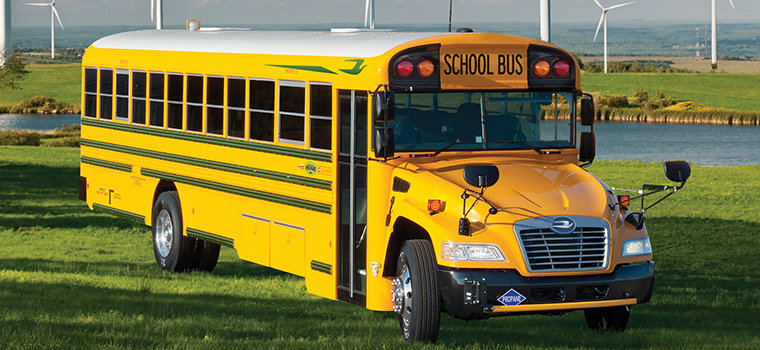Friday, August 23, 2019
(August 23, 2019) — After more than a year of testing, researchers at West Virginia University determined that emissions from propane-fueled school buses are significantly lower than those from diesel buses. Nearly a million students in more than 900 school districts across the country ride to school in propane buses each day.
 West Virginia University researchers measured nitrogen oxides (NOx), highly damaging emissions that are federally regulated due to their negative impact on human health and the environment. According to the Environmental Protection Agency (EPA), exposure to NOx exhaust can trigger health problems like asthma, bronchitis, and other respiratory issues. The primary source of NOx is motor vehicles—including school buses.
West Virginia University researchers measured nitrogen oxides (NOx), highly damaging emissions that are federally regulated due to their negative impact on human health and the environment. According to the Environmental Protection Agency (EPA), exposure to NOx exhaust can trigger health problems like asthma, bronchitis, and other respiratory issues. The primary source of NOx is motor vehicles—including school buses.
“This study is monumental from an emissions and health perspective for students, schools, and communities across the country,” said Tucker Perkins, president and CEO of the Propane Education & Research Council (PERC). “Children arriving to school in propane buses aren’t exposed to harmful NOx emissions; they feel better and are more
prepared to learn.” The comprehensive study was commissioned by PERC.
West Virginia University’s Center for Alternative Fuels, Engines, and Emissions (CAFEE) undertook two types of tests at different times during 2018 on four Blue Bird school buses. Test routes included both city and highway roadways, and a stop-and-go route similar to standard school bus operation. Researchers installed a portable emissions measurement system to determine exhaust emissions on each vehicle, and per- formed test runs on each bus with both cold and hot starts for a total of 36 test routes.
The study results demonstrated that distance-specific NOx emissions measured from a diesel bus were markedly higher than those measured from a pro- pane bus for tests conducted in early 2018, specifically: for the city route, which included city and highway roads, NOx emissions were 15 to 19 times higher for the diesel school bus. NOx was reduced by 95% with the propane bus. For the stop-and-go route, NOx emissions were 34 times higher for the diesel school bus. NOx was reduced by 96% and carbon dioxide was cut 13% with a propane bus.
Further, subsequent testing performed late last year with newer-model-year and lower-mileage propane and diesel buses validated the previous testing results. “In real-world applications, particularly those with significant low-speed or low-load operation, propane vehicles can provide dramatically lower NOx emissions compared to similar diesel vehicles,” said Ross Ryskamp, associate director for testing and development at CAFEE. “These findings are significant due to the fact that NOx and ozone are major nonattainment concerns for many areas across the nation.” Ryskamp added that findings showing high NOx emissions from medium- and heavy-duty diesel vehicles are supported by other published studies.
 West Virginia University researchers measured nitrogen oxides (NOx), highly damaging emissions that are federally regulated due to their negative impact on human health and the environment. According to the Environmental Protection Agency (EPA), exposure to NOx exhaust can trigger health problems like asthma, bronchitis, and other respiratory issues. The primary source of NOx is motor vehicles—including school buses.
West Virginia University researchers measured nitrogen oxides (NOx), highly damaging emissions that are federally regulated due to their negative impact on human health and the environment. According to the Environmental Protection Agency (EPA), exposure to NOx exhaust can trigger health problems like asthma, bronchitis, and other respiratory issues. The primary source of NOx is motor vehicles—including school buses.“This study is monumental from an emissions and health perspective for students, schools, and communities across the country,” said Tucker Perkins, president and CEO of the Propane Education & Research Council (PERC). “Children arriving to school in propane buses aren’t exposed to harmful NOx emissions; they feel better and are more
prepared to learn.” The comprehensive study was commissioned by PERC.
West Virginia University’s Center for Alternative Fuels, Engines, and Emissions (CAFEE) undertook two types of tests at different times during 2018 on four Blue Bird school buses. Test routes included both city and highway roadways, and a stop-and-go route similar to standard school bus operation. Researchers installed a portable emissions measurement system to determine exhaust emissions on each vehicle, and per- formed test runs on each bus with both cold and hot starts for a total of 36 test routes.
The study results demonstrated that distance-specific NOx emissions measured from a diesel bus were markedly higher than those measured from a pro- pane bus for tests conducted in early 2018, specifically: for the city route, which included city and highway roads, NOx emissions were 15 to 19 times higher for the diesel school bus. NOx was reduced by 95% with the propane bus. For the stop-and-go route, NOx emissions were 34 times higher for the diesel school bus. NOx was reduced by 96% and carbon dioxide was cut 13% with a propane bus.
Further, subsequent testing performed late last year with newer-model-year and lower-mileage propane and diesel buses validated the previous testing results. “In real-world applications, particularly those with significant low-speed or low-load operation, propane vehicles can provide dramatically lower NOx emissions compared to similar diesel vehicles,” said Ross Ryskamp, associate director for testing and development at CAFEE. “These findings are significant due to the fact that NOx and ozone are major nonattainment concerns for many areas across the nation.” Ryskamp added that findings showing high NOx emissions from medium- and heavy-duty diesel vehicles are supported by other published studies.

